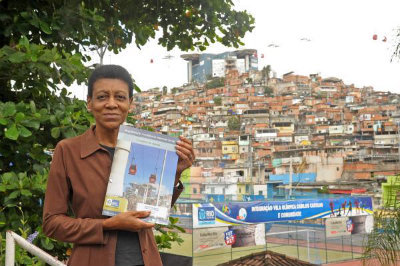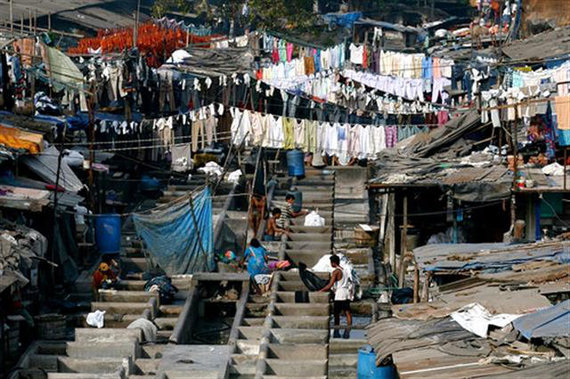Without land titles, residents of informal or marginalized communities are in constant fear of relocation or demolition, and are prevented from benefiting from the land's productive uses. Housing tenure gives slum residents a guaranteed right to the land and their properties, thus enabling them to make investments to improve their living conditions. Four recent initiatives, in Bogotá, Rio de Janeiro, Johannesburg, and Bangalore, are working successfully to resolve the tricky issue of land titling, but issues remain.
An important Colombian law was passed in 2005 to allow for the free transfer of property to informal residents. One of the most successful regularization programs undertaken under this law took place a huge informal settlement in Bogotá, home to over 5,000 families. The project was launched in 2008, and 4,200 property titles have been issued so far. The settlement's land was owned by the central Colombian Government, which presented unique legal challenges. Bogotá's Secretaría Districtal del Habitat was in charge of the complex process of issuing individual titles to settlers. Although the residents were initially reluctant to provide the exhaustive information necessary to obtain the titles, soon a trusting relationship was established between then and the authorities. Houses located in high-risk areas, such as riverbanks, or too close to the Picota jail, the largest in Bogotá, were demolished, and the affected families where included in a relocation program. Thanks to the mass regularization of the informal settlements, the inhabitants of these neighborhoods now enjoy higher living standards, have stronger legal protection, and are further away from poverty as they now have assets they can use to back economic activities.
 Rio de Janeiro is moving forward with the expansion of land titling for its most vulnerable citizens through Minha Casa Minha Vida, the national housing program, and Morar Carioca, the city's urban upgrading program. Minha Casa Minha Vida (My House My Life) supports low-income, first-time homebuyers with the provision of affordable and flexible home-buying schemes, as well as through the provision of land titles upon the receipt of their new homes. In Rio, this program has delivered more than 60,000 new units (and have announced 40,000 more for 2014), all of which have been constructed in formal spaces with adequate legal, urban, and environmental conditions. Morar Carioca complements these efforts by supporting residents of informal settlements through upgrading neighborhood conditions, expanding social services, and conducting regularization and titling services. Two main challenges lie ahead: the need to make land regularization procedures more effective and less bureaucratic, and the need to properly address the rights of residents who don't have legal documentation.
Rio de Janeiro is moving forward with the expansion of land titling for its most vulnerable citizens through Minha Casa Minha Vida, the national housing program, and Morar Carioca, the city's urban upgrading program. Minha Casa Minha Vida (My House My Life) supports low-income, first-time homebuyers with the provision of affordable and flexible home-buying schemes, as well as through the provision of land titles upon the receipt of their new homes. In Rio, this program has delivered more than 60,000 new units (and have announced 40,000 more for 2014), all of which have been constructed in formal spaces with adequate legal, urban, and environmental conditions. Morar Carioca complements these efforts by supporting residents of informal settlements through upgrading neighborhood conditions, expanding social services, and conducting regularization and titling services. Two main challenges lie ahead: the need to make land regularization procedures more effective and less bureaucratic, and the need to properly address the rights of residents who don't have legal documentation.
A flexible, incremental approach to upgrading is also emerging in Johannesburg, as represented by Urban LandMark, which advocates for opening up more officially recognized channels of land supply as a primary means for improving the pro-poor access to and functioning of urban land markets. While an emphasis on individual ownership rights represents one approach to tenure, a second approach emphasizes the administrative and legal mechanisms to tenure security as a first step towards official recognition. The Urban LandMark model, in seeking to realistically provide increasing levels of security during the period between informal settlement of an area and the delivery of ownership (through the housing subsidy), incorporates elements of both views. Urban LandMark's legal innovation entailed an amendment to the zoning scheme, and resulted in 23 settlements being declared as transitional areas in 2009. It remains to be seen how perceptions of interim-focused models will fare in the long term, against the evidence of past provisions and current expectations of formal housing.
 India's most recent policy to tackle urban poverty and create "slum-free cities," Rajiv Awas Yojana (RAY), recognizes the importance of tenure in creating inclusive cities, but has run into obstacles. RAY's main tenet is "the security of tenure through entitlement." To enforce this policy, it is stated that no Central Government support will be given to states which do not give legal entitlement to slum dwellers. The progressive mandate, however, has been less than well received from local governments, leaving RAY in a state of stagnation. At meeting of over 100 policymakers, academics and practitioners at the Center for Environmental Planning and Technology in Ahmedabad, the participants devised strategies and recommendations to encourage movement with the scheme, including reviewing land ownership patterns, providing tenure at the slum level, ensuring that basic services are available, and involving the community in the process. RAY is set to launch now and will be in the implementation phase until 2022.
India's most recent policy to tackle urban poverty and create "slum-free cities," Rajiv Awas Yojana (RAY), recognizes the importance of tenure in creating inclusive cities, but has run into obstacles. RAY's main tenet is "the security of tenure through entitlement." To enforce this policy, it is stated that no Central Government support will be given to states which do not give legal entitlement to slum dwellers. The progressive mandate, however, has been less than well received from local governments, leaving RAY in a state of stagnation. At meeting of over 100 policymakers, academics and practitioners at the Center for Environmental Planning and Technology in Ahmedabad, the participants devised strategies and recommendations to encourage movement with the scheme, including reviewing land ownership patterns, providing tenure at the slum level, ensuring that basic services are available, and involving the community in the process. RAY is set to launch now and will be in the implementation phase until 2022.
Free transfer of property. Affordable home-buying schemes. Transitional areas. Community involvement. All of these are necessary to help slum residents access land tenure rights. Visit URB.im to learn more and to join the discussion.
Photo credits: Secretaria de Estado de Habitação de Rio de Janeiro and the University of Salford Press Office